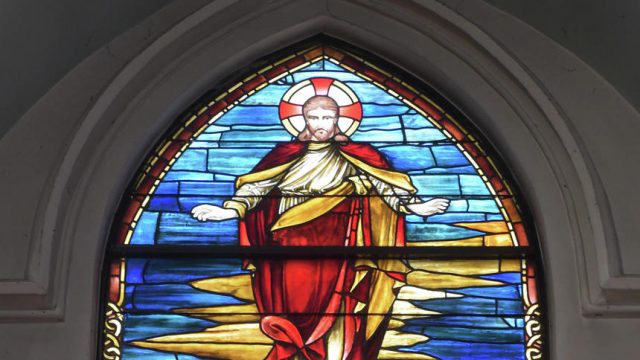Why Shouldn’t We Have Free Speech in Church?

Stained glass window in memory of John Merriam, who was Speaker of the Minnesota House of Representives and father of William Merriam, who was elected Governor of Minnesota in 1888, in St. Paul's Church-on-the-Hill, 1524 Summit Avenue, Tuesday, January 26, 2016. (Pioneer Press: Scott Takushi)
The Trump administration has been signaling their intent to roll back what’s called the Johnson Amendment. Essentially federal policies which prohibits 501(c)3 non-profit groups, including religious organizations like churches, from endorsing candidates.
“Free speech shouldn’t stop at the door of our churches, synagogues and places of worship,” Vice President Mike Pence said at the annual meeting of the Faith and Freedom Coalition earlier this month.
But not all non-profits are on board with the change, including some right here in our state.
[T]he North Dakota Association of Nonprofit Organizations and the North Dakota Community Foundation stand together, along with other nonprofits and foundations across our state, in support of nonprofit nonpartisanship,” the leaders of those groups wrote in a recent letter to the editor of the Fargo Forum.
[mks_pullquote align=”right” width=”300″ size=”24″ bg_color=”#ffffff” txt_color=”#000000″]This would be a change toward making federal policy more permissive. No given group or church would have to engage in politics. They’d simply be allowed to if, through their internal leadership, they decide that sort of advocacy works best for them.[/mks_pullquote]
“Nonpartisanship is critical to the ability of nonprofits, churches and foundations to work with elected officials of all parties at the local, state and federal levels to address community needs throughout North Dakota. Nonprofits are apolitical spaces in our communities, designed to be removed from the political fray, a place where people come together to solve community problems,” they continue.
I can certainly understand why it would be important to the mission of some non-profits to stay away politics. Many of these groups are formed as a way to build coalitions around one cause or another. Political faction is detrimental to that aim. Also, many parishioners probably don’t want to show up to church to hear a campaign ad preached from the pulpit.
But critics of this move are supposing that an and to the Johnson Amendment must mean a politicization of all non-profits.
That seems a little absurd.
This would be a change toward making federal policy more permissive. No given group or church would have to engage in politics. They’d simply be allowed to if, through their internal leadership, they decide that sort of advocacy works best for them.
That may not be the best solution for all, or even most, of these non-profit groups.
I’m not sure why non-profit status must mean a curtailment of free speech. Why should a given church or group have to stay silent when they feel speaking out on a political candidate or issue might be the right course of action?
Ending the Johnson Amendment would be a step toward enhancing free speech in America. That’s a good thing.




